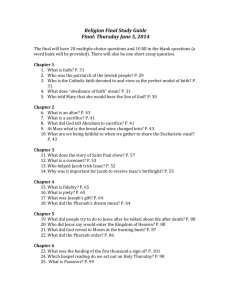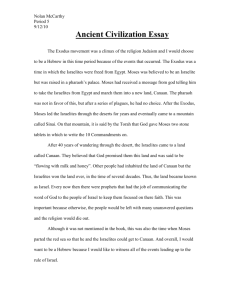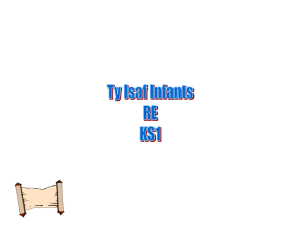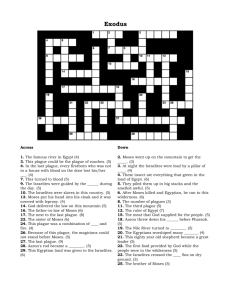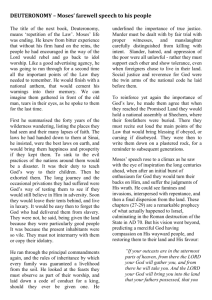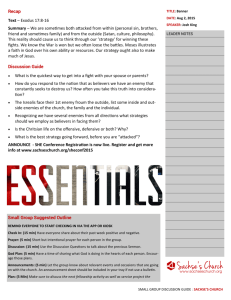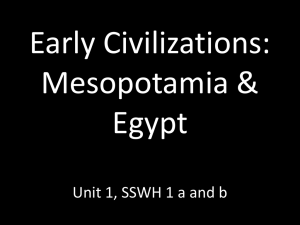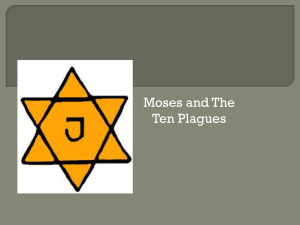Moses-Freeing the Israelites from Egypt
advertisement
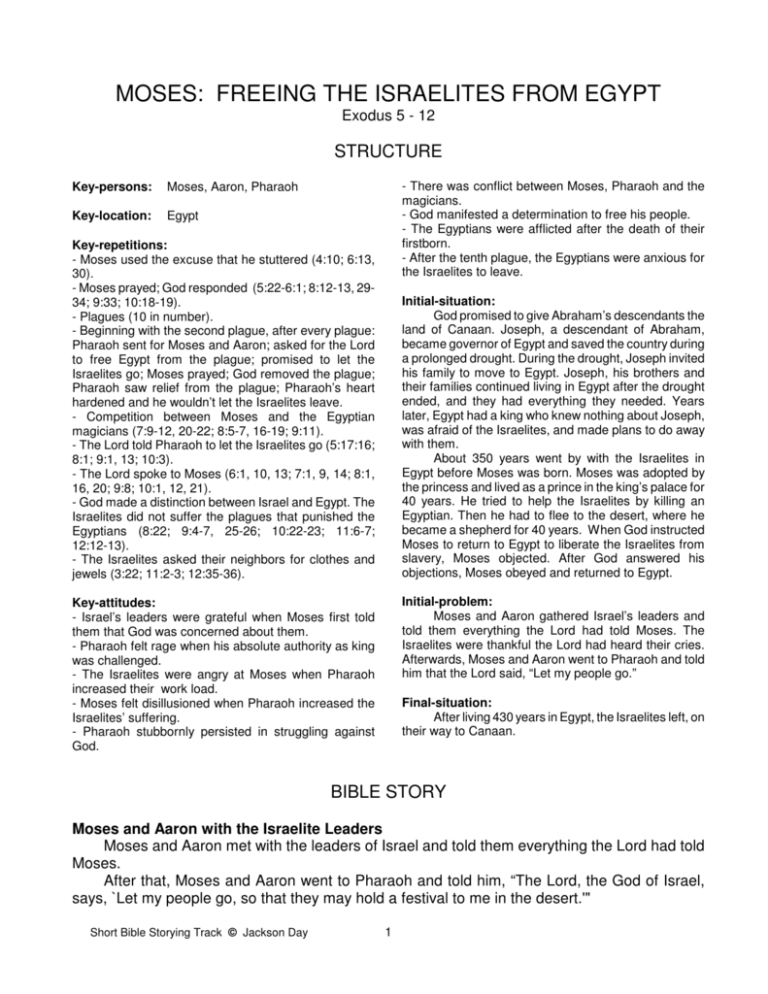
MOSES: FREEING THE ISRAELITES FROM EGYPT Exodus 5 - 12 STRUCTURE Key-persons: Moses, Aaron, Pharaoh Key-location: Egypt - There was conflict between Moses, Pharaoh and the magicians. - God manifested a determination to free his people. - The Egyptians were afflicted after the death of their firstborn. - After the tenth plague, the Egyptians were anxious for the Israelites to leave. Key-repetitions: - Moses used the excuse that he stuttered (4:10; 6:13, 30). - Moses prayed; God responded (5:22-6:1; 8:12-13, 2934; 9:33; 10:18-19). - Plagues (10 in number). - Beginning with the second plague, after every plague: Pharaoh sent for Moses and Aaron; asked for the Lord to free Egypt from the plague; promised to let the Israelites go; Moses prayed; God removed the plague; Pharaoh saw relief from the plague; Pharaoh’s heart hardened and he wouldn’t let the Israelites leave. - Competition between Moses and the Egyptian magicians (7:9-12, 20-22; 8:5-7, 16-19; 9:11). - The Lord told Pharaoh to let the Israelites go (5:17:16; 8:1; 9:1, 13; 10:3). - The Lord spoke to Moses (6:1, 10, 13; 7:1, 9, 14; 8:1, 16, 20; 9:8; 10:1, 12, 21). - God made a distinction between Israel and Egypt. The Israelites did not suffer the plagues that punished the Egyptians (8:22; 9:4-7, 25-26; 10:22-23; 11:6-7; 12:12-13). - The Israelites asked their neighbors for clothes and jewels (3:22; 11:2-3; 12:35-36). Initial-situation: God promised to give Abraham’s descendants the land of Canaan. Joseph, a descendant of Abraham, became governor of Egypt and saved the country during a prolonged drought. During the drought, Joseph invited his family to move to Egypt. Joseph, his brothers and their families continued living in Egypt after the drought ended, and they had everything they needed. Years later, Egypt had a king who knew nothing about Joseph, was afraid of the Israelites, and made plans to do away with them. About 350 years went by with the Israelites in Egypt before Moses was born. Moses was adopted by the princess and lived as a prince in the king’s palace for 40 years. He tried to help the Israelites by killing an Egyptian. Then he had to flee to the desert, where he became a shepherd for 40 years. When God instructed Moses to return to Egypt to liberate the Israelites from slavery, Moses objected. After God answered his objections, Moses obeyed and returned to Egypt. Initial-problem: Moses and Aaron gathered Israel’s leaders and told them everything the Lord had told Moses. The Israelites were thankful the Lord had heard their cries. Afterwards, Moses and Aaron went to Pharaoh and told him that the Lord said, “Let my people go.” Key-attitudes: - Israel’s leaders were grateful when Moses first told them that God was concerned about them. - Pharaoh felt rage when his absolute authority as king was challenged. - The Israelites were angry at Moses when Pharaoh increased their work load. - Moses felt disillusioned when Pharaoh increased the Israelites’ suffering. - Pharaoh stubbornly persisted in struggling against God. Final-situation: After living 430 years in Egypt, the Israelites left, on their way to Canaan. BIBLE STORY Moses and Aaron with the Israelite Leaders Moses and Aaron met with the leaders of Israel and told them everything the Lord had told Moses. After that, Moses and Aaron went to Pharaoh and told him, “The Lord, the God of Israel, says, `Let my people go, so that they may hold a festival to me in the desert.'" Short Bible Storying Track © Jackson Day 1 Pharaoh replied, “I do not know this Lord and I will not let Israel go! Moses and Aaron, you are stopping this multitude of people from working" (5:1-5). Pharaoh ordered the slave masters, “Don’t supply the Israelites with straw for making bricks; make them gather their own. If they work harder, they will stop listening to lies." The slave masters beat the Israelite foremen and asked them, “Why didn't you meet your quota of bricks?” Pharaoh told the he Israelite foremen, “You are lazy! That’s why you whine, wanting to sacrifice to your Lord. Get to work” (5:5-18). The Israelite foremen found Moses and Aaron and told them, “May the Lord punish you for making Pharaoh and his officials hate us! You gave them an excuse to kill us.” Moses prayed, “Lord, why are you treating this people so badly? Is this why you sent me? Since I spoke to Pharaoh in your name, things got worse for your people!” (5:19-22). The Lord spoke to Moses and he quoted the Lord’s words to the Israelites, “I am the Lord; I will free you from the oppression of the Egyptians. I will bring you to the land that I promised to give Abraham, Isaac and Jacob. It will be your own country. I am the Lord.'" The leaders didn’t listen to Moses; their spirits were beaten down by harsh slave conditions (6:1-9). Moses and Aaron with Pharaoh The Lord told Moses, “Tell Pharaoh to let the Israelites go from his country." Moses answered, “If the Israelites won’t listen to me, why would Pharaoh listen? (6:10-30). The Lord told Moses, “I will multiply miraculous signs and wonders, but Pharaoh will not listen to you. With mighty acts of judgment I will bring out my people the Israelites. Then the Egyptians will know that I am the Lord." Moses and Aaron did just as the Lord commanded them. Moses was eighty and Aaron eighty-three when they spoke to Pharaoh (7:1-7). Moses and Aaron went to Pharaoh. Aaron threw his staff in front of Pharaoh and it turned into a snake. The Egyptian magicians threw down their staffs; which also turned into snakes. But Aaron's staff swallowed their staffs. Yet Pharaoh's heart became hard and he would not listen to them, just as the Lord had said (7:8-13). TEN PLAGUES 1st Plague: Water to Blood One morning, Moses and Aaron went to Pharaoh by the Nile River. Aaron struck the river with his staff. All the water became blood; the fish in the Nile died; the river stunk; and the Egyptians could not drink its water. Blood was everywhere in Egypt. The Egyptian magicians did the same thing using their magical skills. Pharaoh’s heart became hard. The Egyptians dug along the Nile to get drinking water (7:14-24). Short Bible Storying Track © Jackson Day 2 2nd Plague: Frogs Seven days after the Lord struck the Nile River, Aaron stretched out his hand over the waters of Egypt, and the frogs came up and covered the land. The magicians did the same thing by their secret arts; they also produced frogs. Pharaoh summoned Moses and Aaron and requested, “Pray to the Lord to rid us of these frogs and I will let your people go to offer sacrifices to the Lord." Moses prayed. The frogs died. Pharaoh saw the relief from the frogs, and he hardened his heart and would not listen (7:25-8:15). 3rd Plague: Gnats Aaron struck the ground with his staff. The dust on the ground throughout Egypt became gnats. The magicians could not produce gnats by their secret arts and they told Pharaoh, “This is the finger of God." But Pharaoh would not listen, just as the Lord had predicted (8:16-19). 4th Plague: Flies Moses confronted Pharaoh, “The Lord says, ‘If you do not let my people go, I will send swarms of flies on your people. But I will deal differently with the land of Goshen, where my people live; no flies will be there. I will make a distinction between my people and your people.’” The next day, the land of Egypt was ruined by flies. Pharaoh summoned Moses and Aaron and said, “I will let you go to offer sacrifices to the Lord your God in the desert. Now pray for me." Moses left Pharaoh and prayed; every single fly left. But Pharaoh hardened his heart and would not let the people go (8:20-32). 5th Plague: Death of the Egyptians’ Livestock The Lord struck the Egyptians’ livestock with a plague. All the Egyptians’ livestock died, but not one animal belonging to the Israelites died. Pharaoh’s heart was unyielding and he would not let the people go (9:1-7). 6th Plague: Boils Moses and Aaron took fistfuls of soot and tossed them into the air in Pharaoh’s presence. The dust caused festering boils on men and animals. The magicians were covered with boils. The Lord hardened Pharaoh's heart just as the Lord had predicted to Moses (9:5-12). 7th Plague: Hail The Lord sent lightning, thunder, and hail. The hail smashed everything growing in the fields and it stripped every tree. Only the land of Goshen, where the Israelites lived, was free from the hailstorm. Pharaoh summoned Moses and Aaron and said, “Pray to the Lord, for we’ve had enough thunder and hail. I’ll let you go.” Moses spread out his hands. The thunder and hail stopped. Pharaoh’s heart turned rockhard. He refused to let the Israelites go, just as the Lord had predicted (9:13-35). 8th Plague: Locust The Lord sent a persistent east wind that brought locusts. They ate everything not destroyed by the hail. Nothing green remained on tree or plant in all the land. Pharaoh quickly summoned Moses and Aaron and said, “I have sinned against the Lord your God and against you. Pray to the Lord your God to take this deadly plague away from me." Short Bible Storying Track © Jackson Day 3 Moses prayed. The Lord reversed the wind into a strong west wind which took every single locust and dumped them into the Red Sea. The Lord hardened Pharaoh’s heart, and he wouldn’t let the Israelites go (10:1-20). 9th Plague: Total Darkness Total darkness covered Egypt for three days. However, there was light where the Israelites lived. The Lord hardened Pharaoh's heart, and he wouldn’t let the people go (10:20-29). 10th Plague: Israelites’ First Passover; Death for Egyptians Moses told Pharaoh, “About midnight the Lord will pass throughout Egypt. Every firstborn son in Egypt will die, and all the firstborn of the cattle as well. But there will be silence among the Israelites, not even a dog will bark. Then you will know that the Lord makes a distinction between Egypt and Israel” (11:1-9). Moses instructed the Israelites to prepare for the tenth plague: Every Israelite family was to take a healthy one-year-old male sheep or goat; slaughter it; take its blood and put it on the sides and tops of the houses’ doorframes; roast and eat the meat; and no one could leave his house until morning (12:1-21). The Israelites did exactly what the Lord commanded Moses and Aaron. At midnight the Lord struck down every firstborn in Egypt, from the firstborn of Pharaoh, who sat on the throne, right down to the firstborn of the prisoner locked up in the dungeon. There was not a house without someone dead! (12:22-30). Exodus from Egypt That night, Pharaoh summoned Moses and Aaron and said, “Get out of here, you and your Israelites! Go, worship the Lord as you have requested. Take your flocks and herds, as you’ve insisted, but go!” The Egyptians wanted to get rid of them in a hurry. The Israelites asked the Egyptians for articles of silver and gold, and for clothing. The Lord made the Egyptians readily give the Israelites what they asked for; so they picked the Egyptians clean (12:30-36). The Israelites started their journey with about two million and five hundred thousand people. They took with them large herds of livestock. The Israelites lived in Egypt for 430 years. At the end of the 430 years, to the day, the Lord's people left Egypt (12:31-41). GENERIC DIALOGUE QUESTIONS 1. 2. 3. 4. 5. 6. 7. 8. What catches your attention in the story? Is there anything in the story that is hard to understand? Who are the main characters in the story? What problems did the characters face? How did the characters face their problems? How have you faced similar problems? Is there someone in the story who is similar to you or who is different from you? What does the story tell about God? Short Bible Storying Track © Jackson Day 4 SPECIFIC DISCUSSION QUESTIONS 1. 2. 3. 4. 5. What were Pharaoh’s reactions when Moses told him that the Lord wanted him to let the Israelites leave Egypt? What were some of the occasions when Moses prayed and God responded? What actions did God take to persuade Pharaoh to let the Israelites leave Egypt? How did God make a distinction between the Israelites he was saving and the Egyptians he was punishing? The next time God makes a distinction between those he is saving and those he is punishing, which group will you be in? LIFE-LESSONS 1. God, being all powerful, can dominate human cruelty and can even use evil intentions for good. God used Pharaoh’s rebellion to show the Egyptians that the Lord is the only living, true and powerful God, and that the Egyptians’ gods were unable to protect them from the God of Israel. 2. Spiritual leaders, whose source of spiritual power is not from God, increase people’s problems instead of solving them. With their arts, the Egyptian magicians were able to reproduce the first two plagues (7:20-22; 8:6-7). They did not have the power to revert the process of the plagues. 3. Events that punish God’s enemies may at the same time benefit those who trust the Lord. The plagues had a double nature: punishment and salvation. The plagues manifested God’s punishment against Egypt, while also manifesting divine action to liberate the Israelites. Christians should interpret each event as part of God’s good purpose for their life (Rom 8:28). Since no event can destroy a believer’s faith, each event contributes to increasing faith that overcomes the world (1 Jn 5:4). Short Bible Storying Track © Jackson Day 5 4. Every time a person resists God, he becomes more stubborn. However, no one can struggle against God and win. The king struggled against God and thought that the Lord could not make him give in. Even after all the terrible plagues, Pharaoh was stubborn and refused to free the Israelites (11:10). 5. God makes distinction between those he is saving and those who are destined for punishment. God made a distinction between the Israelites and the Egyptians (9:6-7; 11:7). God made a distinction between Noah’s family inside the ark and those outside (Gn 6:21-23). Believers in Jesus will be protected from the punishment that will afflict those who reject Jesus. 6. God only liberates those who accept his salvation plan. During the Exodus, only those inside houses with blood on the doorpost escaped death (Ex 12:1-36). The Lord rejected the garments Adam and Eve made for themselves (Gn 3:21). He refused Cain's offering (Gn 4:5, 7). Noah built the ark exactly as God instructed. During the flood, there was only one ark and it only had one door (Gn 6:16).The New Testament reveals that Jesus is the only way to God (Jn 14:6).
